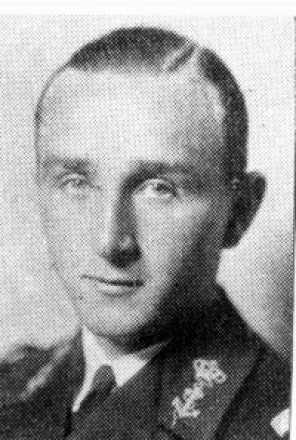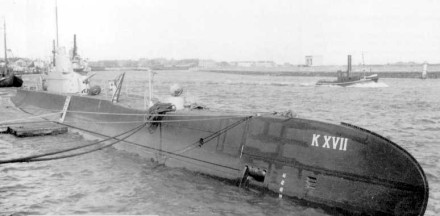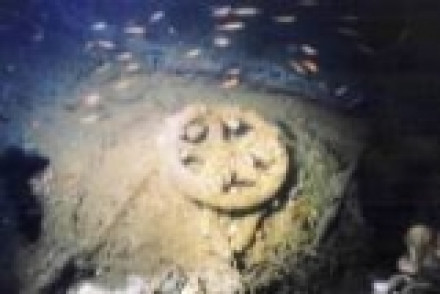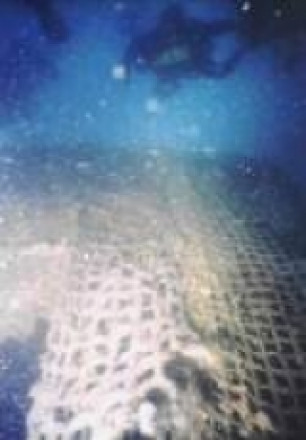History
Construction
The submarine Hr. Ms. KXVII was completed at the Feijenoord shipyard in Rotterdam in 1933. Two years later, she sailed to the former Dutch East Indies for service in the Royal Netherlands Navy. She would serve the Royal Netherlands Navy in the Dutch East Indies for several years.
Loss
After the occupation of the colony by the Japanese, the KXVII was placed under the command of the British navy with Singapore as its home port. When returning from a mission in December 1941, the KXVII sailed into a recently laid Japanese mine field near the island of Pulau Tioman in the South China Sea. the ship struck a mine and sunk. The whole crew was lost. The last radio contact with the home base had been on December 19th.
Conspiracy theory
In 1980, a bizarre conspiracy theory was brought up by Sir Christopher Creighton, a member of MI5, who claimed that he had blown up the KXVII. The reason for this supposedly was that the Dutch submarine had spotted a Japanese fleet on December 6th 1941, heading for Pearl Harbour. According to Creighton, this was not allowed to become public, because this would mean the attack on Pearl Harbour might not go through and then the Americans would not be involved in the war.
The search for the K XVII
This idea received much public attention and provoked Hans C. Besançon Jr., the son of the lost submarine's commander and himself a retired officer of the Royal Netherlands navy, to undertake a crusade to find his father's resting place and disprove the fabrications.

Description
Yard: Feijnoord Werf, Rotterdam
Propulsion: 2x 1600 hp diesel, 2x 430 hp electric
Armament:
8x 21" torpedo tubes
1x 8.8 cm gun
1x 40 mm machine gun

| Master | Henri C. Besançon |
|---|---|
| People on board | 36 |
| Power | 3200 hp |
| Speed | 17 knots ~ 20 mph (31 km/h) |
| Speed submerged | 9 knots ~ 10 mph (17 km/h) |
| Length | 241 ½ feet (73.6 m) |
| Width | 21 ¼ feet (6.5 m) |
| Displacement | 865 ton |
| Displacement submerged | 1045 ton |
Status
Discovery
The trail led to a treasure diver from Singapore who supposedly located a sunken Dutch submarine on the South China Sea at a depth of about 50 meters. By following him, Hans Besançon Jr. could find the wreck and they managed to salvage the steering wheel of the exposed bridge. When the serial number was referenced with the data of the ship, the ship positively identified as the KXVII.
Besançon's quest and its findings had attracted considerable public attention, so when Swedish diver Sten Sjöstrand reported finding another sunken submarine in 1995 that he suspected to be Dutch, the naval authorities were interested. It was suspected that this concerned the Hr. Ms. O16. They initiated a search for family members of the men lost on O16, and organised an expedition to examine the wreck and the suspicion turned out to be true.


Wreck plundered
Even though the wreck of K XVII is a designated war grave, World War II wrecks such as this one are under constant threat of being commercially salvaged. Reports of illegal work near wreck sites from World War II caused the Cultural Heritage Agency of the Netherlands (RCE) to start an investigation into the Hr. Ms. O16 and KXVII in 2019, together with the Royal Netherlands Navy and the Malaysian authorities. The thing that was feared, turned out to be the truth. The sites had been stripped and the wrecks had disappeared except for a few remains.
The iron of these ships is valuable and sought after. It has an unusual composition since it was produced before nuclear weapons had been detonated in the atmosphere from 1945 onward. Because of this, the iron was not exposed to radioactivity during its production and has a very low background radiation. Due to this it is very useful for producing certain types of sensitive equipment for instance.
These illegal salvages had destroyed two war graves. Because of this, the Dutch and Malaysian authorities made agreements concerning better protection and the RCE conducted another investigation there into the wrecks of the Hr. Ms. O20 and KXVI. The expectation was that both ships would have been plundered. This was the case with the KXVI but the wreck of the O20 turned out to still be in its place.
Documentary on the discovery of the O22, also featuring the search for the KXVII.
References
- Münching, L.L. (1978).
Schepen van de koninklijke marine in de 2e wereldoorlog. p 44. - Traces of War.
Hr. Ms. K XVII: sunk by a mine or an assault?. - SNO.
K XVII. - RCE.
Nederland en Maleisië zetten stappen in samenwerking oorlogswrakken. - Dutch Submarines.
KXVII.